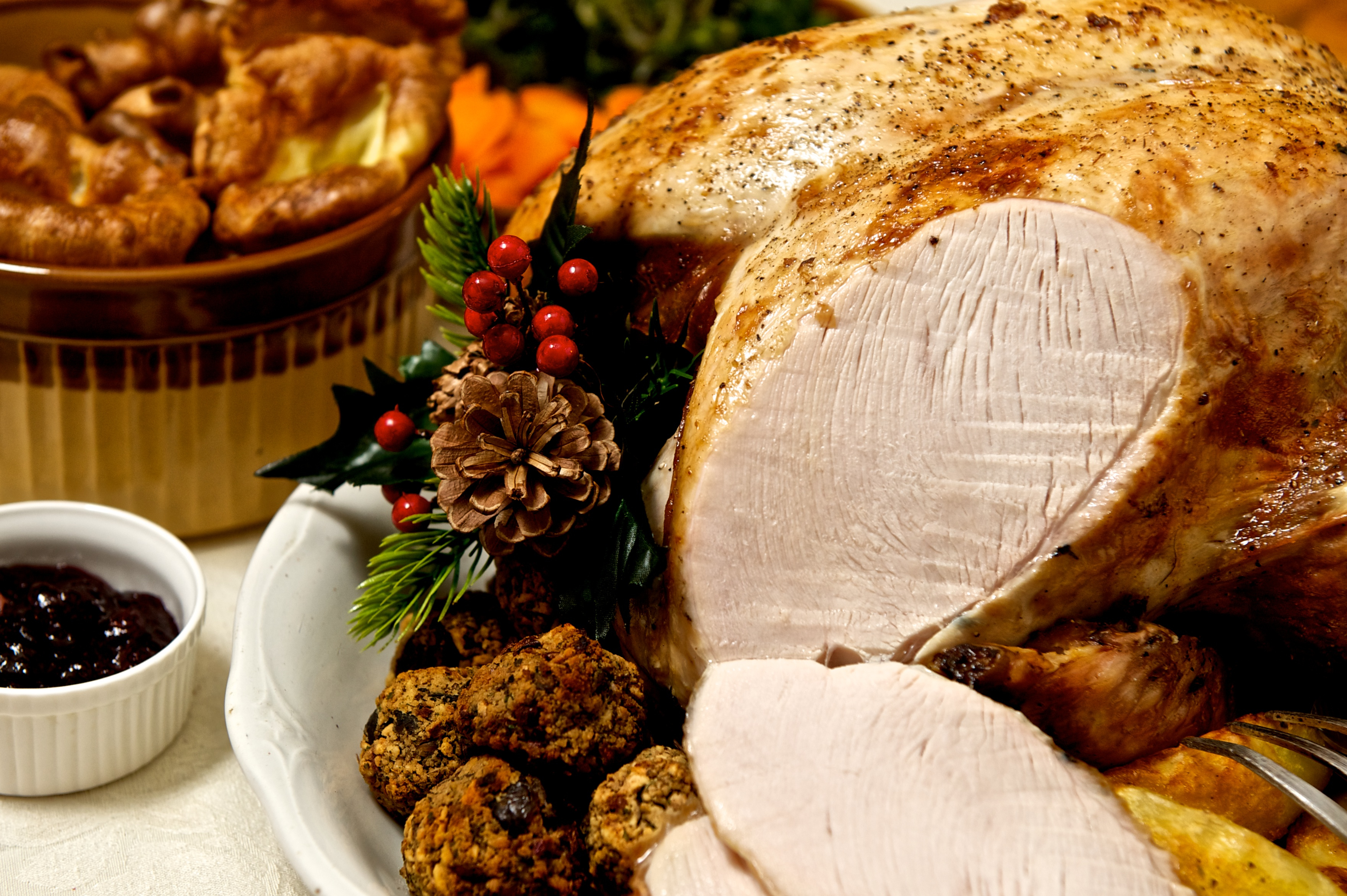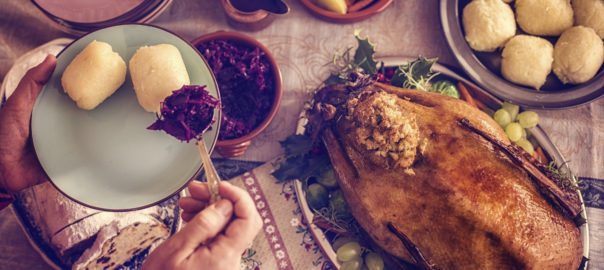This weeks’ article is written by our guest blogger, Miguel Toribio-Mateas, who provides a light-hearted look at Christmas meals and his top five functional festive foods. Christmas can often be a time of overindulgence and we tend to be spoilt for choice at the dinner table. With an abundance of roasted vegetables, dark chocolate and steamed sprouts on offer, Miguel explores the nourishment which is found on many dinner plates during the festive season.
The sheer thought of Christmas lunches and dinners make some people think of overindulgence and expanding waistlines. Today I’m looking at festive meals through a special pair of specs, and the only rose-tint is that of the obligatory drop of mulled wine. Once you focus on the nourishing aspects of the meals ahead you’ll realise that they’re not that bad at all and, in fact, festive food does have a wealth of therapeutic properties. Here are my top 5 functional foods that I hope you enjoy as much as I do.
The obligatory turkey
Turkey is a rich source of the essential amino acid tryptophan. Tryptophan is a precursor to the neurotransmitter serotonin, is often described as the “happy neurotransmitter”. Serotonin reuptake inhibitors are a popular type of anti-depressant drugs that block the recycling of the neurotransmitter, so more of it stays active, enhancing a feeling of well-being and diminishing feelings of worry, anxiety and depression. Serotonin that has been metabolised naturally from food also has similar effects on mood, as well as on satiety – the “feeling full factor” – and sleep quality. So, falling asleep in front of the fire after a copious Christmas lunch may have something to do with how serotonin is itself a precursor to melatonin, a neurohormone produced in the pineal gland which helps regulate the day/night cycle. In terms of macronutrients, turkey is a really good source of protein which, by nature, helps keep your blood sugar levels stable. So, if you’d like to avoid succumbing to cravings for Christmas pudding, a generous portion of turkey, followed by a little break before deciding on whether you’re having dessert, could also help.

The lovely roasted parsnip
Tryptophan is a bit of a tricky nutrient, in that it requires the presence of a carbohydrate in order for it to travel across the blood brain barrier, the protective immune layer that keeps our brain safe from invasion by bacteria, viruses, parasites, etc. as well as toxins. Given the choice between having a turkey butty or a serving of parsnips, I’d plump for the parsnips every single time. Why? Well, gram per gram, parsnips are a lot more interesting functionally than bread. And they provide a source of carbohydrate that’s mostly soluble fibre. Soluble fibre is pre-biotic by nature, i.e. it feeds the microbes that live in your gut, widely known as your “gut flora”. The science that describes the relationship between the gut and the brain, and the communication between these two vital organs is booming. We know that beneficial gut bacteria thrive in an environment that’s rich in soluble fibre. These bugs feed on soluble fibre, fermenting it and going on to produce a number of natural molecules. Some of them, known as short-chain fatty acids, have protective effects on a number of health conditions. For example, butyrate – a fatty molecule also present in butter – has been identified as having anti-inflammatory properties and is currently investigated as a promising therapeutic agent with little, if any, side effects.
Sprouts anyone?
Well, you may be more tempted to say yes after knowing that nutrients in sprouts and similar vegetables like cabbage can help reduce the risk of some cancers. Of particular interest are isothiocyanates, a sulphur-containing chemical group that is able to stimulate cellular detoxification enzymes, such as glutathione, help cells metabolise toxins and relieve them of their burden by avoiding accumulation, that could otherwise trigger mutations leading to cancer. Some believe that detoxification (or “detox” for short) is something that happens naturally via our liver and kidneys, that deal with all potential toxicants we encounter throughout our lives, getting rid of them effectively without the need to intervene. The reality is that detoxification is a function that takes place 24/7 in every cell of our bodies and that some natural compounds like those in sprouts, can help us promote cellular health. This is different to a “3-day detox tea” or a “detox diet”, which are probably why most people are confused. An upcoming poster by the British Association for Applied Nutrition and Nutritional Therapy (BANT), to be launched in the New Year, will illustrate the detoxification process in detail. Please follow @BANTonline on Twitter for updates.
If you’re more of a red cabbage kind of person, you can give the sprouts a miss knowing that your choice is also highly therapeutic. Flavonoids in red cabbage are known to stimulate the production of nitric oxide, a natural muscle relaxant with a particular affinity for the muscle lining the walls of blood vessels. As the muscle in your blood vessels relaxes, your blood pressure goes down, which may also contribute to that lazy-but-nice post-Christmas meal feeling…
Stuff it!
With chestnuts, please, as these little gems are rich in fibre, and vitamin B6 and folate; two of the key nutrients for heart and brain health. They’re delicious roasted too. I grew up in Spain where they’re sold by street merchants in Christmas street markets. And if you’re worried about overindulging in sugary puddings, they could be the perfect alternative to saying yes to that slice of cake that you know you’ll regret later… a few roasted chestnuts with a little dark chocolate melted on top may be the perfect solution for you if you’re not a hopeless sweet-tooth.
70 Plus
No, it’s not an advert for Saga holidays. It’s about how a high cocoa chocolate, with a minimum of 70% cocoa mass, is a good source of magnesium and contains a variety of flavonols believed to support good cardiovascular health by making blood less sticky, thereby preventing blood clots. They also seem to have a positive effect on cholesterol balancing. Surprised? You hadn’t thought that indulging on a bit of chocolate would keep your GP happy? Well, research on a specific type of flavonoids called catechins – also present in other foods like green and black tea – has identified them as potential natural aids to cognitive health. A word of caution: This is not an excuse to go through the whole of that chocolate tin in one sitting. Choose your chocolate carefully and make sure that it has minimal ingredients; cocoa mass, and a little sugar plus some vanilla flavouring. I prefer my cocoa organic and fair trade but this doesn’t influence the health outcomes, or at least we don’t know it does by means of reliable studies.
I hope that my top picks help you see your Christmas meal in a different light. It’s a time for celebration and togetherness, so if it comes with a little indulgence, do not worry about it too much as life goes on and one meal is one drop in a very large ocean. You can at least remain reassured that by choosing the right amounts of the right foods you’re still nourishing your body and promoting health to ensure you have a fabulous New Year. May I take this opportunity to with you and yours a wonderful festive season.
Miguel Toribio-Mateas

Miguel is a nutrition practitioner, author and researcher with extensive knowledge and expertise in functional medicine and ageing science. Miguel completed a MSc in Clinical Neuroscience at Roehampton University in 2016 and was awarded a scholarship for multidisciplinary doctoral research in brain ageing and cognitive decline by Santander Bank, assessing the clinical application of the Bredesen Protocol under the auspices of the Institute for Work Based Learning at Middlesex University.
Related Cytoplan blogs
Indulging in resveratrol & cocoa flavanols this Christmas?
Tips to avoid Christmas weight gain
Secrets for a gluten-free Christmas
National Chocolate week – the benefits of eating dark chocolate
The science and history behind detoxification
If you have any questions regarding the topics that have been raised, or any other health matters please do contact me (Amanda) by phone or email at any time.
amanda@cytoplan.co.uk, 01684 310099
The Cytoplan editorial team: Miguel Toribio-Mateas, Joseph Forsyth and Joanna Doverman.
Last updated on 14th December 2016 by cytoffice



Just had to say what a great article this is! Though not a health professional I have had many years living with IBD and using diet and supplements to keep me in remission and really appreciate the breakdown of the dreaded Christmas lunch into a fabulously positive experience. The author writes in an informative and entertaining manner and what a great idea to highlight all the benefits to health of the individual elements in each item. He’s actually made me really excited about Christmas lunch. I’d love a cookery book written like this. More please!
Great article! I love Christmas dinner and will enjoy it even more now.
A most useful article to read with so much pointers of note on the benefits of sensible and healthy eating over the festive season. Thank you.
Enjoyed reading this and sharing! Thank you
Great insight into what is most definitely a healthy meal. I’ll be indulging!